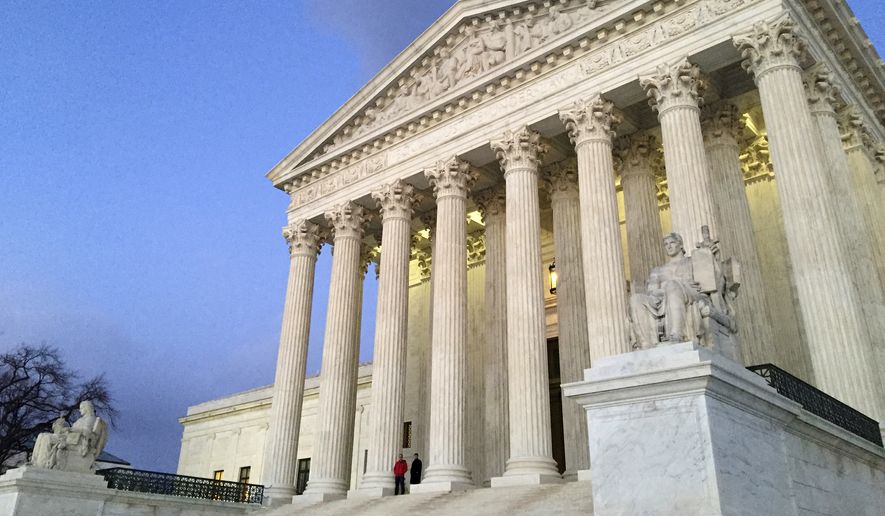The government cannot censor trademarks on the grounds they may be offensive to some, the Supreme Court ruled Monday in a major decision that could also clear the way for the Washington Redskins football team to maintain its trademarks.
The case before the high court involved an Asian rock band named “The Slants.” The U.S. Patent and Trademark Office originally denying the band’s name, saying it was a racial slur that violated the agency’s policy, based on federal law, that prohibits granting disparaging trademarks.
Justices, though, said that violated the First Amendment.
“Speech may not be banned on the ground that it expresses ideas that offend,” Justice Samuel A. Alito Jr. said in his opinion for the court.
The American Civil Liberties Union, which supported the band, said Monday’s ruling was a huge win for the First Amendment and prevents the government from policing speech.
“The Slants chose their name to reappropriate a racial slur used against their community, with the goal of deflating the word’s hurtful power,” said Lee Rowland, an attorney for the ACLU. “The government’s misguided effort to protect minorities from disparagement instead hurt members of that very community by hindering their right to compete in the marketplace of ideas.”
SEE ALSO: Supreme Court to hear major political redistricting case
The ruling was 8-0, though four justices joined a concurring opinion. Justice Neil Gorsuch didn’t participate in the case.
Government lawyers had argued that since a federal agency ruled on trademarks, they amounted to a form of government speech. That, the lawyers said, meant the government had the right to prohibit ones deemed offensive.
The court, though, said trademarks are private speech.
“Holding that the registration of a trade-mark converts the mark into government speech would constitute a huge and dangerous extension of the government-speech doctrine, for other systems of government registration (such as copyright) could easily be characterized in the same way,” Justice Alito wrote.
The holding could dictate what happens with the Redskins’ case after the trademark office, at the urging of Native American groups, rejected their trademark, and the team appealed to the U.S. Court of Appeals for the 4th Circuit. The case was put on hold to await the Supreme Court’s decision in the band’s case.
The team was thrilled by the Supreme Court ruling in the trademark case, said the Redskins’ attorney Lisa Blatt.
“The Supreme Court vindicated the Team’s position that the First Amendment blocks the government from denying or cancelling a trademark registration based on the government’s opinion,” Ms. Blatt said.
“I am THRILLED! Hail to the Redskins,” Dan Snyder, owner of the Washington Redskins, said in a statement.
The Native American groups had argued that the Patent and Trademark Office had a duty to encourage racial tolerance and protect minorities from demeaning messages in commercial advertising.
But Justice Alito rejected that, saying the line between commercial and non-commercial speech is tough to spot, and the First Amendment has long protected Americans’ rights to be offensive.
“Speech that demeans on the basis of race, ethnicity, gender, religion, age, disability, or any other similar ground is hateful; but the proudest boast of our free speech jurisprudence is that we protect the freedom to express ’the thought that we hate,’ ” Justice Alito wrote.
Simon Tam, lead singer of the Slants, had suggested there was a way to uphold his trademark while not deciding on broader issues that affect the football team name.
But the court said major First Amendment issues were at stake and chose to rule broadly, striking down the “disparagement clause” in trademark law.
“I think the Redskins are going to be able to go back to the Patent and Trademark Office and say they are entitled to maintain those registrations,” said J. Michael Keyes, an intellectual property lawyer and partner at Dorsey & Whitney.
Trademark law is full of confusing cases. The television show “Queer Eye for the Straight Guy” was registered by the trademark office, but “Clearly Queer” was rejected. “Permachink” was accepted, but “chink proud” was rejected.
Mr. Keyes also said Monday’s ruling will affect disparagement clauses in state trademark laws, pointing to a provision in Washington state that mirrors the Lanham Act, which was at issue in the Slant’s case.
“That provision in our state statute is unconstitutional in light of the court’s decision,” he said.
• Andrea Noble and Nora Princiotti contributed to this article.
• Alex Swoyer can be reached at aswoyer@washingtontimes.com.




Please read our comment policy before commenting.